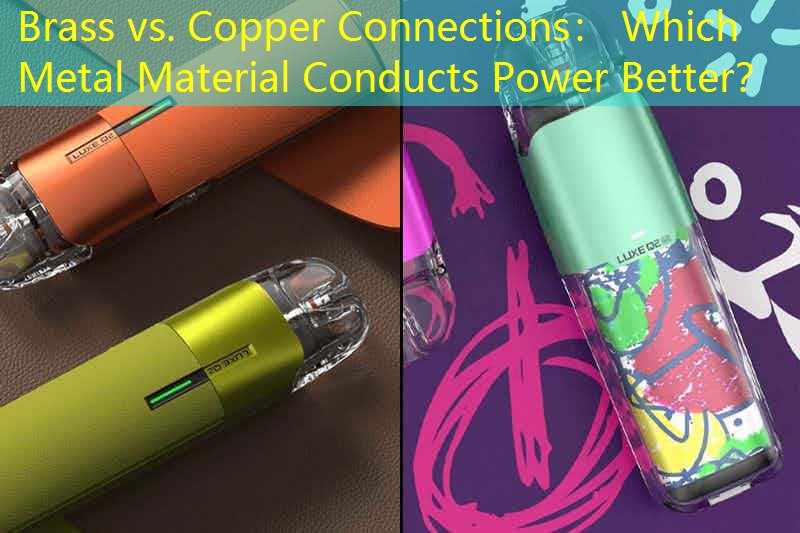Giới thiệu: Understanding the Importance of Conductivity in Metal Connections
In the realm of electronic devices, kết nối nguồn đóng một vai trò quan trọng trong việc đảm bảo chức năng hiệu quả. Cho dù bạn đang thiết kế thuốc lá điện tử hay bất kỳ thiết bị nào khác yêu cầu nguồn điện đáng tin cậy, lựa chọn kim loại phù hợp cho các kết nối là điều cần thiết. Đồng thau và đồng là hai vật liệu phổ biến được sử dụng trong kết nối điện, nhưng cái nào thực sự dẫn điện tốt hơn? Bài viết này đi sâu vào so sánh chi tiết giữa đồng thau và. kết nối đồng, khám phá tính dẫn điện của chúng, độ bền, và sự phù hợp cho các ứng dụng khác nhau.
So sánh độ dẫn điện: Đồng thau vs. Copper
One of the primary factors to consider when selecting metal materials for electrical connections is conductivity. Điều này đề cập đến khả năng truyền dòng điện của kim loại. Nói chung là, copper is known to have superior conductivity compared to brass. Copper boasts an impressive electrical conductivity rating of around 59.6 x 10^6 S/m, making it one of the best conductors available.
Ngược lại, brass, an alloy primarily made of copper and zinc, typically has a conductivity of about 28 x 10^6 S/m. This reduction is significant, as lower conductivity can lead to energy losses in connections. Do đó, when high efficiency and low resistance are desired, copper connections are often preferred.

Durability and Corrosion Resistance
While conductivity is essential, the durability of the metal should not be overlooked. In environments where moisture, độ ẩm, or other corrosive factors are present, the corrosion resistance of the materials becomes crucial.
Copper, despite its superior conductivity, is susceptible to oxidation over time, which can affect its performance. Mặt khác, brass is known for its excellent resistance to corrosion and is less likely to tarnish when exposed to air.
To illustrate this, consider the following table comparing the properties of brass and copper:
| Property | Copper | Brass |
|---|---|---|
| Electrical Conductivity | 59.6 x 10^6 S/m | 28 x 10^6 S/m |
| Corrosion Resistance | Vừa phải | Cao |
| Cost | Higher | Lower |
Weight and Size Considerations
When designing compact devices such as electronic cigarettes, weight and size of materials become significant constraints. Copper is denser (8.96 g/cm³) compared to brass (8.4 g/cm³), which might impact the overall weight of the device. For manufacturers aiming for lightweight solutions, utilizing brass can reduce the total weight without significant compromises on strength and durability.

In practical applications, an e-cigarette using brass connections could provide a lighter alternative while maintaining a robust product structure. It becomes essential for designers to balance between conductivity and weight, especially considering portability.
Environmental Impact and Sustainability
Hôm nay, many manufacturers and consumers are increasingly aware of environmental impacts when selecting materials. Copper mining and refining can be resource-intensive and often leads to ecological concerns due to its environmental footprint.
Brass, as a recyclable alloy, may present a slightly lower ecological impact during processing. Tuy nhiên, the entire lifecycle from extraction to disposal needs to be evaluated when deciding on material selection for environmentally conscious products.
Câu hỏi thường gặp
1. Why is copper often considered the better choice for electrical connections?
Copper is recognized for its exceptional electrical conductivity, which results in higher efficiency in power transmission. This makes it a preferred option for applications where low resistance and optimal current flow are required.
2. Is brass suitable for applications that require high conductivity?
While brass is a durable and corrosion-resistant option, it is not as conductive as copper. Vì thế, it may not be ideal for high-current applications where electrical efficiency is paramount.
3. How does corrosion behavior affect the choice between brass and copper in electronic devices?
Corrosion resistance is vital in maintaining the integrity of electrical connections. Brass generally offers better corrosion resistance than copper, making it more reliable in moisture-prone environments, albeit at the expense of conductivity.







